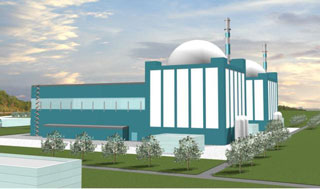ASE and Carsib sign contract for Belene
24 November 2008
Russia's AtomStroyExport (ASE) has sub-contracted Carsib, an Areva/Siemens consortium, for the control and automation systems to be used in the Belene nuclear power plant in Bulgaria.
 |
| The planned Belene plant (Image: NEK) |
ASE won the tender in 2006 to supply two 1000 MWe reactors at Belene, scheduled to begin operating in 2014 and 2015. Two AES-92 model VVER units with V466 pressurised water reactors are being designed, constructed and commissioned by the Russian firm following the acceptance of its bid by directors of state-owned utility National Electric Company (NEK) in October 2006. A €4 billion ($6.4 billion) contract was signed in January between NEK and ASE for the construction of the two reactors, which will be similar to the two already built by ASE at Tianwan in China.
Under a contract signed with ASE on 21 November, Carsib will provide the overall project and interface management for its scope. The consortium will supply the safety-related part of the heating, ventilation and air conditioning systems, as well as the safety and operational instrumentation and control (I&C) systems, electrical systems and components. In addition, it will supply refrigerating systems and auxiliary safety equipment, such as hydrogen re-combiners.
Areva noted that it has previously successfully cooperated with ASE during the modernization of units 3 to 6 at Bulgaria's Kozloduy nuclear power plant. It has also participated in the modernization and construction of several VVER-type reactors, including at Bohunice in Slovakia, Dukovany in the Czech Republic, Paks in Hungary and Tianwan in China.
In July 2008, Bulgaria's government gave its approval for the construction of the Belene nuclear power plant by ASE. The two new reactors at Belene will be 51% owned by NEK, while RWE of Germany was recently selected by NEK to take the remaining 49% in the project. However, NEK has permitted RWE to invite other companies to become its partner in the project. Discussions with GdF-Suez are in progress and there is speculation a deal could involve that company's subsidiary, Electrabel.
Construction began on four reactors at Belene under plans drawn up by Bulgaria's communist government and the Soviet Union. Work on site began in 1987 but ceased in 1991, leaving some infrastructure available for reuse. Impetus to restart the project came when Bulgaria had to shut down two reactors at its Kozloduy plant in order to join the EU in 2007. The cost of the early shutdowns has been estimated at €3 billion ($4.4 billion), partly due to the lack of a surplus of electricity for export to countries such as Greece, Turkey, Serbia and Macedonia.